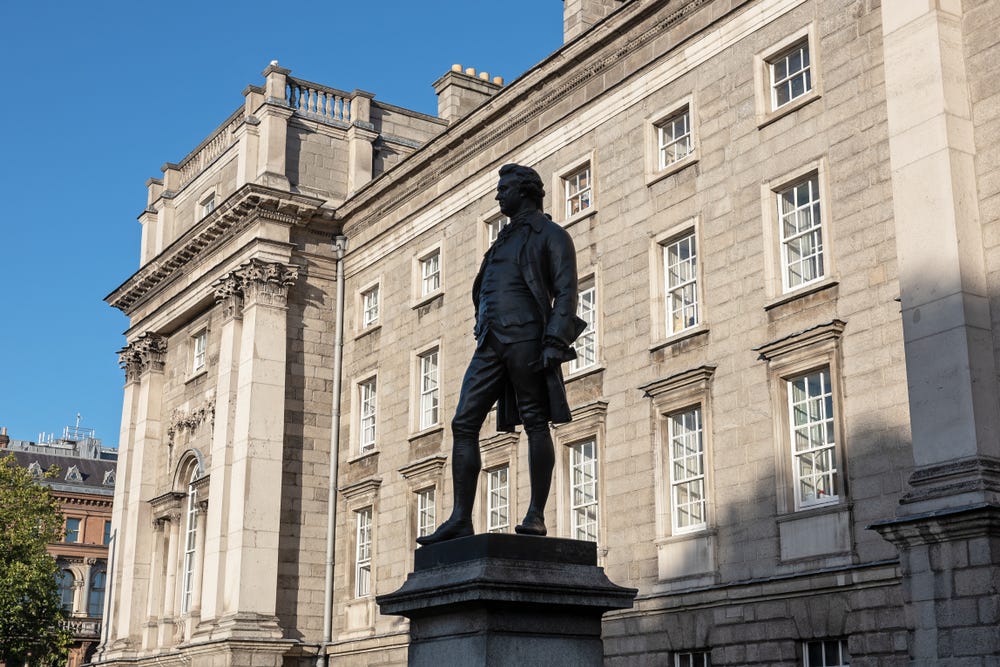E-Pluribus | July 1, 2022
Is the apparent preeminence of courts harming the country, doing hard things, and Edmund Burke still speaks clearly in 2022.
A round-up of the latest and best writing and musings on the rise of illiberalism in the public discourse:
John O. McGinnis: A Republic, or a Juristocracy?
Whether or not you agree with recent Supreme Court decisions, there is no denying the widespread perception that our nation is governed by judges. John McGinnis at City Journal notes the current court’s tendency to downplay modern trends and sensibilities while focusing on the Constitution’s original meaning when formulating opinions, a contrast to what left-leaning courts have done for decades. McGinnis says this version of the Roberts court could help the American people better understand how the Constitution intended the government to function.
The Roberts Court faces a tough task because it must speak to the American people through channels in which most messengers and interpreters—the press and the academic world—are radically hostile to its messages. Indeed, their hostility is magnified by the recognition that Court is now the one institution historically dedicated to reason that progressives do not control. Progressives may have an easier time accepting that elections may sometimes go against them: politics can be dismissed as an arena of base interests and manipulation. But when an institution dedicated to reasoned deliberation and interpretation is not aligned with the progressive program, it creates a serious threat to progressive hegemony over social thought. The Court’s opportunity to contest that hegemony and restore the fixed foundations of our republic thus provides the crucial social context of its opinions this term.
[ . . . ]
Dobbs, of course, will be remembered for overturning Roe v. Wade. But it also offers the most deliberate debate on constitutional interpretation in decades. The majority is clear that the Constitution’s text should ideally be understood today as the Framers would have understood it. And the Court makes clear the benefits of its interpretation to the public. On controversial issues on which the Constitution is silent, democracy offers the flexibility to make varied compromises over time.
New York State Pistol and Rifle Association v. Bruen was similarly notable for endorsing originalism…
In Kennedy v. Bremerton School District, Justice Neil Gorsuch held that the meaning of the First Amendment’s Establishment Clause flows from its text and historical understandings and thus did not interfere with private prayer even during a public school event, such as a football game…
These three opinions make clear not only that originalism is now the Court’s interpretive philosophy but also that the Court intends to explain why the original meaning remains relevant today. And the rise of a consistent originalism also explains the vehemence of the dissents because so much of the leftward movement in our public life previously had been at the direction or sufferance of the judiciary.
Read the whole thing.
Steve Magness: We Need to Do Hard Things
The rapid increase in technology often has us focusing on how it can make our lives easier. Channeling John F. Kennedy’s moon-shot speech about doing things “not because they are easy, but because they are hard,” Steve Magness at Quillette writes that Americans would do well to relearn the value of facing what we might rather not face.
Flipping out when asked to wear a mask in a store or on a plane. Trigger warnings. Safe spaces in a university. Avoiding controversial topics. Banning books that have any semblance of a connection to CRT. Accidentally using the wrong verbiage. Trolling, blocking, or censoring people online. What do these things have in common?
Discomfort. We don’t like it. We avoid it.
Something makes us feel anxious, stressed, or uncertain and we can’t handle it. A book, mask, online troll, ideology, or a slight sensation of physical effort and fatigue makes us feel out of sorts, and we seek to eliminate that sensation as quickly as possible…
[ . . . ]
We’ve lost the ability to navigate our inner worlds, to sit with or navigate anything uncomfortable. We avoid, push away, or lash out because we don’t know how to handle discomfort. In fact, you may be experiencing that right now. At the mere mention of masks, CRT, or safe spaces, perhaps your mind jumped into “protect and defend” mode. Ready to label, discredit, and dismiss this very essay.
[ . . . ]
A recent study found that seeking out discomfort is motivating when it’s done in pursuit of growth. Those who sought discomfort instead of focusing on the outcome or benefit of an activity were more engaged and open to reading about and learning from the other side of a controversial topic. Furthermore, when people were recruited to have a discussion with someone on the other side of the political aisle, those who were instructed to seek out discomfort were more open and receptive to opposing viewpoints than those who were told to try to learn from the other person. When it comes to dealing with controversial topics, the answer isn’t to avoid politics as we do at family gatherings across the country. The answer is to make embracing discomfort the goal.
When we embrace discomfort, we take ourselves out of protect-and-defend mode and into a place to be challenged and grow. As we’ve long known in the world of exercise, a little bit of stress is a good thing. It sends the signal to your body to adapt and grow stronger. The same principle applies to our psychological stressors. A little bit of stress can open the way to resilience.
Read it all here.
Daniel B. Klein & Dominic Pino: Edmund Burke and the Perennial Battle
The observation by the writer of Ecclesiastes that there is “nothing new under the sun” has held up pretty well, even in the modern age. A new book of Burke quotations edited by Daniel Klein & Dominic Pino (and excerpted in National Review) illustrates the point well as Burke’s centuries-old words ring true in 2022.
As a politician, Burke supported many different reforms in his day. He wrote a plan for the gradual emancipation of African slaves. He supported reforms to the British East India Company, which he believed had abused the British public’s trust in it. He supported Catholic emancipation in England. He favored letting the American colonies secede from Britain, without a fight.
What he couldn’t stand was radical proponents of change for its own sake. In 1796’s “A Letter to a Noble Lord,” Burke outlines what he calls “a marked distinction between Change and Reformation.” He writes that change “alters the substance of the objects themselves; and gets rid of all their essential good, as well as of all the accidental evil annexed to them.” Change throws the baby out with the bathwater. On the other hand, reformation is “a direct application of a remedy to the grievance complained of.”
The advantage of reformation, Burke says, is that “if it fails, the substance which underwent the operation, at the very worst, is but where it was.” The French did not have that advantage in their revolution. The revolutionaries “complained of everything; they refused to reform any thing; and they left nothing, no, nothing at all unchanged,” Burke wrote. And they ended up in squalor and conflict.
Radical philosop and ideologies don’t cause the natural human penchants and instincts that attract people to radicalism. Radical philosophers and ideologies are downstream of those penchants and instincts. In the latter years of his life, Burke explored the threat, upstream and downstream, showing us the perennial battle we cannot help but involve ourselves in.
Burke devoted the last years of his life to fighting against radicalism, dogmatism, and stubborn, foolish instincts. The radicalism we see today is not the product of Jean-Jacques Rousseau, Marx, left-wing universities, socialist intellectuals, or the Frankfurt School. Those are cop-outs. Radicalism is a product of human nature, and that hasn’t changed since Burke put pen to paper.
Read it all.
Around Twitter
Wesley Yang uses a missing persons notification from the Toronto Police to illustrate where the gender identity movement has taken us:
Via a Heterodox Academy podcast, some thoughts from Batya Ungar-Sargon on some of the harmful tendencies of modern journalism:
And finally, via Glenn Greenwald, we’re all just living in the Handmaid’s Tale now apparently, so nothing else matters:












